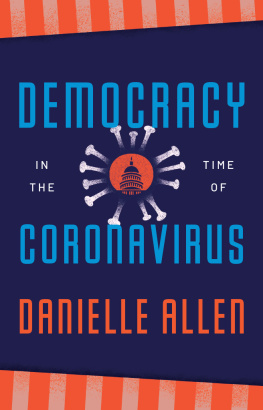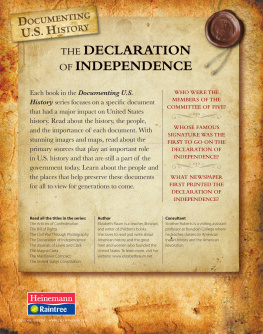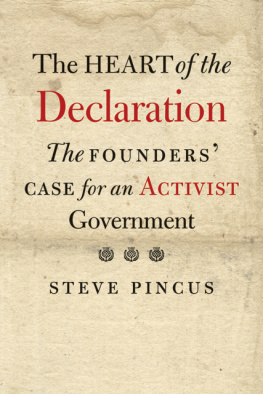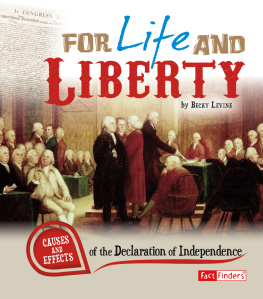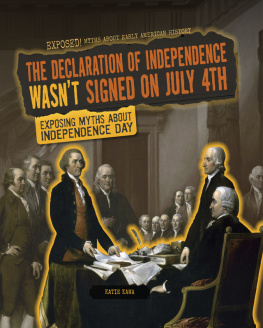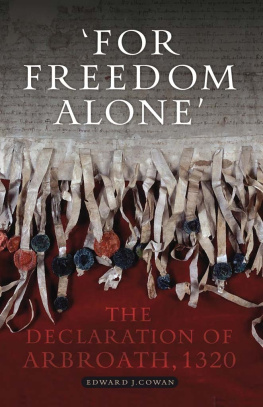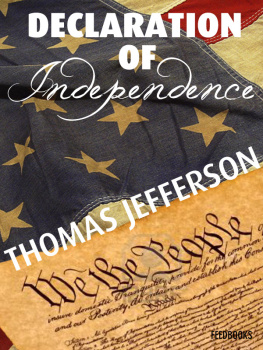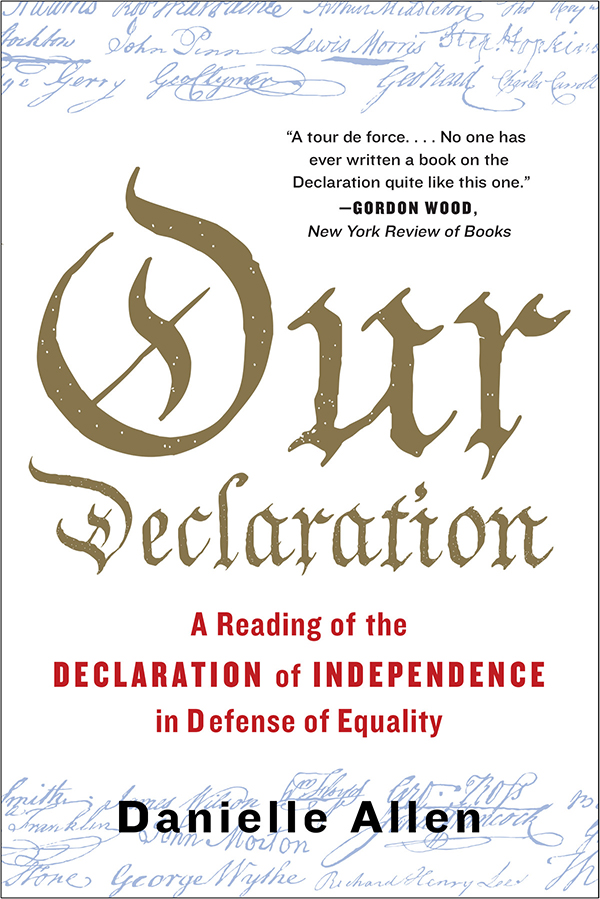
Also by
DANIELLE ALLEN
World of Prometheus: The Politics of
Punishing in Democratic Athens
Talking to Strangers: Anxieties of Citizenship
Since Brown v. Board of Education
Why Plato Wrote
Education, Justice, and Democracy
(co-edited with Rob Reich)
From Voice to Influence:
Understanding Citizenship in the Digital Age
(co-edited with Jennifer Light)


Copyright 2014 by Danielle Allen
All rights reserved
First published as a Liveright paperback 2015
Odyssey Project course taught by Danielle Allen and Robert von Hallberg,
session on the Declaration of Independence, Dec. 7, 2006, photograph credit:
Illinois Humanities Council.
For information about permission to reproduce selections from this book,
write to Permissions, Liveright Publishing Corporation,
a division of W. W. Norton & Company, Inc.,
500 Fifth Avenue, New York, NY 10110
For information about special discounts for bulk purchases, please contact
W. W. Norton Special Sales at specialsales@wwnorton.com or 800-233-4830
Book design by Barbara Bachman
Production manager: Julia Druskin
The Library of Congress has cataloged the printed edition as follows:
Allen, Danielle S., 1971
Our Declaration : a reading of the Declaration of Independence in defense of equality /
Danielle Allen. First edition.
pages ; cm
Includes bibliographical references and index.
ISBN 978-0-87140-690-3 (hardcover)
1. United States. Declaration of IndependenceCriticism, Textual.
2. EqualityUnited States. I. Title.
E221.A475 2014
973.3'13dc23
2014009825
ISBN 978-0-87140-813-6 (e-book)
ISBN 978-1-63149-044-6 pbk.
Liveright Publishing Corporation
500 Fifth Avenue, New York, N.Y. 10110
www.wwnorton.com
W. W. Norton & Company Ltd.
Castle House, 75/76 Wells Street, London W1T 3QT
PRAISE FOR
OUR DECLARATION
Our Declaration sets forth a bold thesis.... Allens passion for each of the Declarations 1,337 words is admirable.
Steven B. Smith, New York Times Book Review
In this profoundly intelligent and achingly intimate work, Danielle Allen lays bare the Declarations history and significance, in the process returning it to its true and rightful ownersyou and me. I can recall no book in recent memory that has given me so great a gift as Our Declaration .
Junot Daz, author of This Is How You Lose Her
Danielle Allen has written an uncommonly elegant, incisive, and often poetic primer on Americas cardinal text. Blending a seasoned scholars acumen with a master teachers artistry, this book is must-reading for all who care about the future as well as the origins of Americas democracy.
David M. Kennedy, author of Freedom from Fear: The American People in Depression and War, 19291945
Allen brings the analytical skills of a philosopher, the voice of a gifted memorialist, and the spirit of a soulful humanist to the task at hand, and manages to do something quite rare, find new meaning in Jeffersons understanding of equality.
Joseph J. Ellis, author of Revolutionary Summer: The Birth of American Independence
A rare and singular work that throws open a door to anyone with a stake in democracy.
Ann Marie Lipinski, curator, Nieman Foundation for Journalism, Harvard University
This wise and rich book is what we need in these troubled timesa robust and persuasive defense of equality and liberty grounded in our national scripture. Danielle Allen is a towering political philosopher of the democratic art of being and a force for good!
Cornel West, author of Democracy Matters: Winning the War on Imperialism
Danielle Allen celebrates the Declaration of Independence by reading it closelyline by line, comma by commaand invites her fellow citizens to do the same. The result is a richly rewarding book that demonstrates the pleasures of slow reading, the power of words to shape events, and the importance of equality to democratic life.
Michael Sandel, author of What Money Cant Buy: The Moral Limits of Markets
It has always been the fate of the Declaration of Independence to bounce back and forth between the political equivalents of foster homes and orphanages.... Danielle Allen has stepped into this tricky breach with an elegant book, deeply moving in many places, personal and conversational in style and yet also seriously philosophical and closely exegetical of the Declarations text.
Steven F. Hayward, National Review
At once simple, sharp and deftly executed.
Kirkus Reviews
Allen, a mixed-race African American, argues that the hypocrisy of the eighteenth-century revolutionaries does not negate the enduring wisdom of their words. The same love of equality and freedom that courses eloquently though the Declaration motivated both her white great-grandmother to campaign for suffrage and her black grandfather to found a chapter of the NAACP in the Jim Crow South. Its legacy can be just as powerful today.
Michael Kazin, Dissent
Danielle Allen brings intense insight to the reading with a phrase by phrase exegesis. She elegantly demonstrates that we cannot have liberty without equality.
Dan Freeman, Galveston County Daily News
Allen... convincingly demonstrates that the Declaration is founded on the idea that equality is the sole foundation on which we can build lasting and meaningful freedom.
David Cochran, Southern Illinoisan
The Declaration has stirred Allen mightily. She describes teaching it as a transformative experience, and she has responded with all of her being, as a scholar, a citizen, and a human being. This is engaged scholarship in a fulsome sense. Our Declaration: A Reading of the Declaration of Independence in Defense of Equality is also clearly conceived and written.
Paul Seaton, Library of Law and Liberty blog
For Stefan, Isaac, Nora, and William
And for their peers, the parents of their peers,
and their own children.
Although we seem trapped in an age of anger and despair, the alternatives remain the same as in all other ages. We can scuttleor we can sail the seas. Navigare necesse est. One must chart his course and sail.
ALLISON DAVIS, first tenured African American professor at the University of Chicago, in a graduation address there in 1970

| 1774 |
| JULY | Thomas Jefferson writes A Summary View of the Rights of British America, his first published account of the grievances of the colonies against King George III. |
| SEP. 5OCT. 26 | First Continental Congress convenes in Philadelphia; it addresses a petition for redress of grievances to King George III. |
| 1775 |
| APRIL 19 | Battles of Lexington and Concord. |
| MAY 10 | Second Continental Congress convenes in Philadelphia. |
| JUNE 13 | John Wentworth, the royal governor of New Hampshire, besieged in his own home, flees to British protection. |
| JUNE 20 | Thomas Jefferson arrives in Philadelphia to join the Second Continental Congress. |
| JULY 6 | Congress approves the Declaration of the Causes and Necessity of Taking Up Arms, written by John Dickinson and Thomas Jefferson. |
Next page

